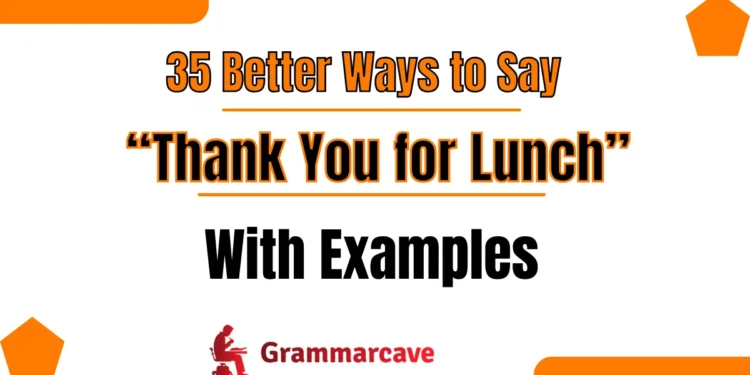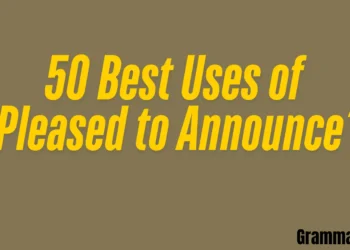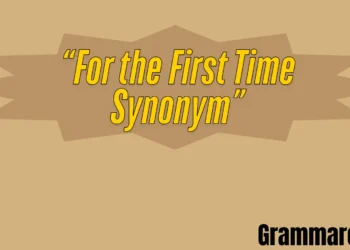The expression “Thank you for lunch” captures a gentler aspect of life. It incorporates the meal and the love, time, and effort that were invested in preparing it. At a social or business event, the Appreciation of acknowledgment can be flagged, even at a casual get-together, and it always remains in style.
This phrase can be used at any moment in a board meeting or social gathering. Its greatest strength lies in the sentiment behind it. It does not matter whether it is an emotionally charged or rigid formal instance; as long as the tone and context are valid, the phrase can be helpful.
Is “Thank You for Lunch” Polite and Professional?
Yes, absolutely. “Thank you for lunch” is
- Polite: It illustrates Appreciation and that which conveys good manners.
- Professional: This suits corporate relations, particularly when a coworker, client, or superior invites you for lunch or dinner.
As described above, for more formal communication, you can say,
- “Thank you for a lovely lunch. Great lunch combined with an engaging discussion.”
- “Thank you for treating me to lunch today—I appreciate it.”
- It was very thoughtful.”
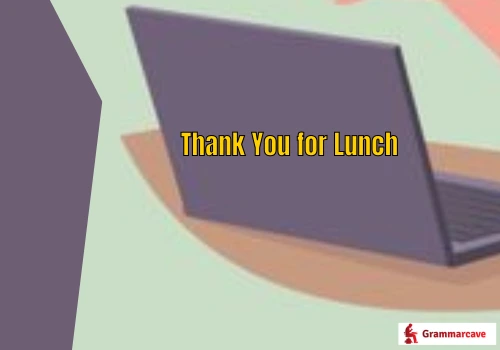
Advantages of Saying “Thank You for Lunch”
1. Builds Relationships
- Appreciation helps build bonds. Gratitude fosters cohesiveness when given in a personal social context and helps build rapport professionally.
2. Shows Appreciation
- It acknowledges someone’s effort, time, or generosity—even if lunch seemed casual or routine.
3. Social impressions
- In a work setting, Appreciation is perceived as an act of kindness, a show of respect, and emotional understanding.
4. Encourages Reciprocity
- When you appreciate someone’s gesture, it often encourages ongoing mutual respect and consideration.
5. Versatile & Timeless
- It’s appropriate across cultures, age groups, and social settings.
Disadvantages or Limitations
1. May Sound Too Generic (if overused or said without emotion)
- Just saying “Thanks for lunch” without sincerity or tone can seem impersonal.
- A better alternative in such cases is: “Thanks again for lunch—it was great catching up with you!”
2. Lacks Detail
- It doesn’t specify what you appreciated (the food? the company? the setting?), which might come off as too brief or minimal.
- Fix: Add context or personalization—”Thank you for lunch today. That pasta was incredible!”
3. Not Always Appropriate Alone
- In formal or high-stakes business settings, a short phrase might need to be part of a longer thank-you note or follow-up email.
1.”I appreciate the delicious meal!”
- Meaning: Combines gratitude with a compliment about food quality.
- Definition: A two-part expression thanking the host while praising the meal itself.
- Explanation: This goes beyond basic thanks by noting the food’s enjoyable nature, making it more personal.
- Example: “How you picked that perfect wine pairing shows your expertise – I appreciate the delicious meal!”
- Best Use: When the food was notably excellent, especially if the host selected/cooked it.
- Worst Use: If the food was mediocre (risks sounding insincere) or in fast-food settings.
- Tone: Warm, complimentary, with genuine appreciation.
2.”That was beyond delicious—thanks!”
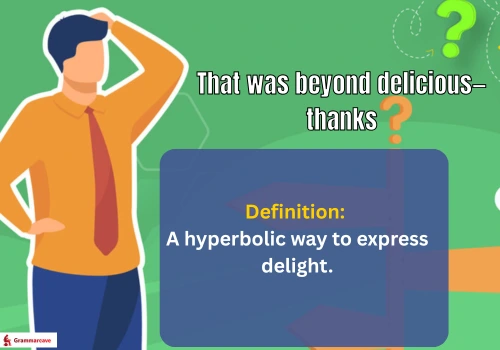
- Meaning: The food was delicious.
- Definition: A hyperbolic way to express delight.
- Explanation: Adds extra emphasis for meals that wow you.
- Example: Your aunt’s signature dish: “That was beyond delicious—thanks!”
- Best Use: When the flavors genuinely blow you away.
- Worst Use: If the food was just “okay” (could seem exaggerated).
- Tone: Excited, effusive, and informal.
3. “I appreciate the great company and food!”
- Meaning: Thanks for both the meal and the enjoyable conversation/company.
- Definition: A two-part gratitude expression.
- Explanation: Perfect for social meals where the experience matters as much as the food.
- Example: After a dinner party: “I appreciate the great company and food!”
- Best Use: Social gatherings or heartfelt moments.
- Worst Use: If the company was awkward or forced.
- Tone: Warm, balanced, and relational.
4. “I loved every bite—thanks!”
- Meaning: The meal was thoroughly enjoyable from start to finish.
- Definition: Emphasizes consistent delight in the food.
- Explanation: Great for complementing a cook’s skills.
- Example: After a homemade pie: “I loved every bite—thanks!”
- Best Use: When the food was flawless.
- Worst Use: If you secretly left food on your plate.
- Tone: Enthusiastic and specific.
5. “You’re the lunch MVP—thank you!”
- Meaning: Playfully crowns the person as the hero of the meal.
- Definition: Lighthearted and sports-inspired gratitude.
- Explanation: Perfect for group settings where someone takes the lead.
- Example: A friend organizes a picnic spread: “You’re the lunch MVP—thank you!”
- Best Use: Casual, fun group dynamics.
- Worst Use: Formal or professional scenarios.
- Tone: Playful and energetic.
6. “I appreciate the gesture!”
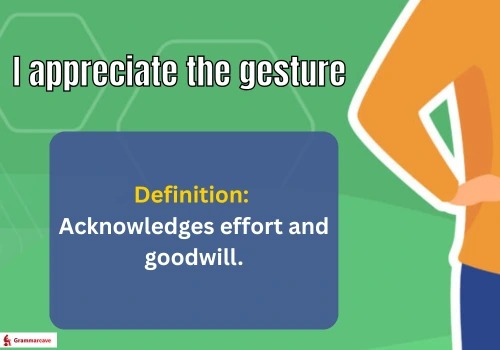
- Meaning: Values the intention behind the meal as much as the food itself.
- Definition: Acknowledges effort and goodwill.
- Explanation: Works well when the meal is a symbolic act of care.
- Example: Someone brings you coffee and a muffin “just because “: “I appreciate the gesture!”
- Best Use: Small, thoughtful acts.
- Worst Use: If the food was a grand or expected gesture (e.g., a wedding meal).
- Tone: Warm and understated.
7. “Thanks for the filling meal!”
- Meaning: The food was satisfying and substantial.
- Definition: Focuses on practicality (e.g., hunger solved).
- Explanation: Ideal for hearty, comfort-food scenarios.
- Example: After a stew and bread dinner: “Thanks for the filling meal!”
- Best Use: Family-style or rustic meals.
- Worst Use: For delicate, small-portioned dishes.
- Tone: Content and grateful.
8. “Thanks for the fantastic food!”
- Meaning: A vibrant, versatile compliment.
- Definition: Versatile praise for delicious meals.
- Explanation: Works in most settings where the food is notably good.
- Example: At a potluck: “Thanks for the fantastic food!”
- Best Use: Social gatherings or standout dishes.
- Worst Use: If the food was average (may sound generic).
- Tone: Energetic and sincere.
9. “I’m so grateful for your generosity!”
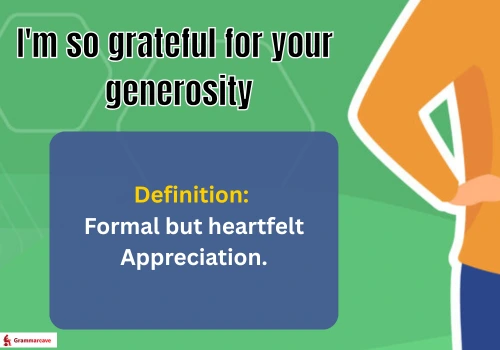
- Meaning: Profound Appreciation for a meal that is similar to a gift.
- Definition: Formal but heartfelt Appreciation.
- Explanation: Fits when the meal involves significant cost or effort.
- Example: After a hosted multi-course dinner: “I’m so grateful for your generosity!”
- Best Use: Special occasions or grand gestures.
- Worst Use: For casual coffee or snacks.
- Tone: Earnest and respectful.
10. “Thanks for the great food!”
- Meaning: Simple Appreciation focusing on the meal’s quality.
- Definition: A straightforward way to thank someone while acknowledging good food.
- Explanation: More generic than #2-3, but still adds a positive descriptor (“great”).
- Example: “That new Italian place? Thanks for the great food—I’m going back!”
- Best Use: Everyday lunches where the food was satisfying but not extraordinary.
- Worst Use: If the food was terrible (apparent mismatch between words and reality).
- Tone: Casual, uncomplicated appreciation.
11. “You’re too kind—thanks for lunch!”
- Meaning: Thank the person while complimenting their generous nature.
- Definition: A humble expression that credits the giver’s character.
- Explanation: “To kind” suggests the gesture was beyond what was expected or necessary.
- Example: “Paying for everyone? You’re too kind—thanks for lunch!”
- Best Use: When someone goes above and beyond (e.g., group treatment).
- Worst Use: If the lunch was a simple/expected gesture (may sound oddly self-deprecating).
- Tone: Gracious, slightly deferential.
12. “You made my day with this lunch—thanks!”
- Meaning: Suggests the meal had a significant positive impact.
- Definition: Hyperbolic but endearing, implying the lunch was a highlight.
- Explanation: To say “That made my day” comes with a strong emphasis reserved for truly uplifting experiences.
- Example: “That surprise birthday lunch? You made my day—thanks!”
- Best Use: For special occasions or when someone lifts your spirits.
- Worst Use: For routine meals (overkill).
- Tone: Emotionally charged and effusive.
13. “That was so generous—thank you!”
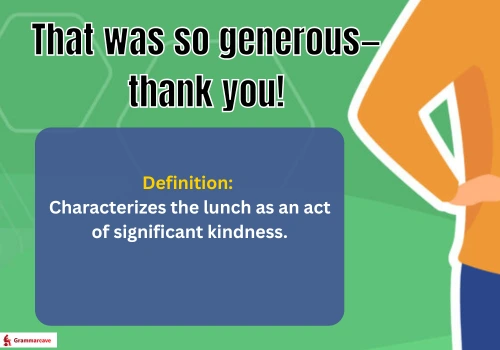
- Meaning: The person receiving this form of kindness will have their generosity undermined in a soft, surprising manner.
- Definition: Characterizes the lunch as an act of significant kindness.
- Explanation: Implies the meal was more lavish or considerate than typical.
- Example: “You took me to that Michelin-starred place? That was so generous—thank you!”
- Best Use: When someone splurges or goes above normal hospitality.
- Worst Use: For Dutch-treat meals or casual coffee meetups.
- Tone: Humble, admiring.
14. “I owe you one for lunch!”
- Meaning: Gives thanks but acknowledges the giver in a way that creates a positive obligation for the future.
- Definition: Informal promise to return the favor.
- Explanation: Creates social debt in a friendly, non-serious way.
- Example: “You always get the check—I owe you one for lunch next time!”
- Best Use: Among friends or colleagues with give-and-take relationships.
- Worst Use: In formal settings or with superiors where Reciprocity isn’t expected.
- Tone: Casual, indebted, and companionable.
15. “You’re the best—thanks for lunch!”
- Meaning: Combines gratitude with hyperbolic praise of the giver.
- Definition: Lighthearted, superlative compliment.
- Explanation: Uses exaggeration for an affectionate effect.
- Example: “You remember my favorite restaurant? You’re the best—thanks for lunch!”
- Best Use: With close friends or when someone demonstrates thoughtfulness.
- Worst Use: In professional emails or with acquaintances (may seem insincere).
- Tone: Playful, effusive, and familiar.
16. “Thanks for the awesome food!”
- Meaning: Youthful, energetic, thanks for great eats.
- Definition: “Awesome” gives a modern, casual vibe.
- Explanation: Less formal than “delicious” or “wonderful.”
- Example: “Dude, those loaded nachos? Thanks for the awesome food!”
- Best Use: Millennial/Gen Z friends or fun foodie adventures.
- Worst Use: Corporate environments or fine dining.
- Tone: Laid-back and spirited.
17. “You’re amazing—thanks for lunch!”
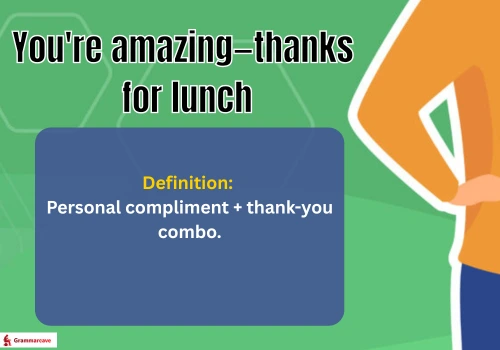
- Meaning: Directly praises the giver alongside gratitude.
- Definition: Personal compliment + thank-you combo.
- Explanation: Makes it about the person, not just the food.
- Example: “You drove across town just for this place? You’re amazing—thanks!”
- Best Use: When someone goes out of their way.
- Worst Use: If the person did nothing special.
- Tone: Admiring, affectionate, and personal.
18. “Thanks for feeding me!”
- Meaning: Playful, slightly self-deprecating thanks.
- Definition: Humorous way to acknowledge being nourished.
- Explanation: Implies you were hungry/needy in a funny way.
- Example: “I was hangry until now—thanks for feeding me!”
- Best Use: With friends who appreciate humor.
- Worst Use: Formal settings or with sensitive people.
- Tone: Silly and lighthearted.
19. “That was so thoughtful—thank you!”
- Meaning: Thanks for the consideration behind the meal.
- Definition: Highlights the intention more than the food itself.
- Explanation: It is excellent when the meal is personalized.
- Example: “You remembered my diet restrictions? That was so thoughtful—thank you!”
- Best Use: When special effort/attention was shown.
- Worst Use: Generic meals with no particular thought.
- Tone: Touched and deeply grateful.
20. “I’m so full and happy—thank you!”
- Meaning: Physical satisfaction + emotional gratitude combined.
- Definition: Casual thanks emphasizing satiety and joy.
- Explanation: Great for comfort food or abundant meals.
- Example: “That all-you-can-eat BBQ? I’m so full and happy—thank you!”
- Best Use: After hearty meals with close friends/family.
- Worst Use: Business lunches or first dates (too informal).
- Tone: Contented, slightly humorous, and relaxed.
21.”Thanks for the yummy meal!”
- Meaning: Casual, childlike, Appreciation for tasty food
- Definition: Simple gratitude using playful language
- Explanation: Wonderful as an adjective expresses a particular joy that is innocent and easy.
- Example: “Those cookies were still warm! Thank you for the yummy meal!”
- Best Use: Informal settings with close friends/family.
- Worst Use: Business meals or formal occasions.
- Tone: Lighthearted and unpretentious.
22.”You made lunch so special—thank you!”
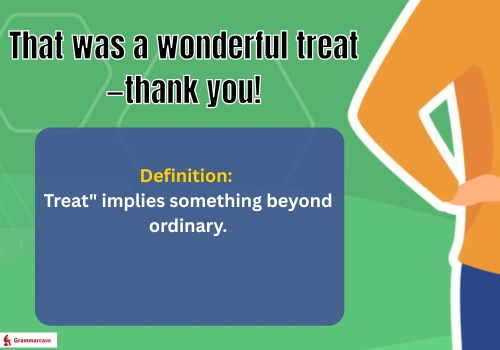
- Meaning: Recognizes extra effort that elevated the experience.
- Definition: Thanks for the intentional enhancements.
- Explanation: This implies that the host added personal touches.
- Example: “The handwritten menu cards? You made lunch so special—thank you!”
- Best Use: When a noticeable effort was put into presentation/details.
- Worst Use: For completely ordinary meals.
- Tone: Emotionally touched and impressed.
23.That was precisely what I needed today; thank you!
- Meaning: Show that the lunch was satisfying and timely.
- Explanation: A way to acknowledge that the meal came at the perfect time.
- Example: “That was exactly what I needed today; thank you! I was hungry.”
- Best Use: When the lunch was exactly what you needed.
- Worst Use: If the lunch wasn’t satisfying, it may sound overly dramatic.
- Tone: Grateful and upbeat.
24.”Thanks for the delightful lunch!”
- Meaning: Polite, slightly refined Appreciation.
- Definition: “Delightful” suggests charming, pleasant qualities.
- Explanation: Implies aesthetic and social enjoyment.
- Example: “The tea sandwiches and garden setting made for a delightful lunch—thank you!”
- Best Use: Afternoon/brunch gatherings.
- Worst Use: Fast food or rushed meals.
- Tone: Cheerful and genteel.
25.”That hit the spot—thank you!”
- Meaning: Perfect satisfaction of a craving/need.
- Definition: Colloquial expression of ideal fulfillment.
- Explanation: Suggests the meal was exactly what was wanted/needed
- Example: “After that hike, the burger hit the spot—thanks!”
- Best Use: Casual meals when particularly hungry.
- Worst Use: Formal dining situations.
- Tone: Satisfied and colloquial.
26. “Thanks for the satisfying meal!”
- Meaning: Emphasizes physical fulfillment
- Definition: Appreciation for substantial nourishment.
- Explanation: Shifts the focus to satisfaction instead of taste.
- Example: “That hearty stew was exactly what I needed —thanks for the satisfying meal!”
- Best Use: After physically demanding days.
- Worst Use: For light snacks or tasting menus.
- Tone: Contented and grounded.
27. “You’re a great host—thanks for lunch!.”
- Meaning: Compliments hospitality skills.
- Definition: Praises overall hosting abilities.
- Explanation: Recognizes service, atmosphere, and attention.
- Example: “From the music to the wine pairings, you’re a great host—thanks!”
- Best Use: When someone entertains at home.
- Worst Use: Basic restaurant meetups.
- Tone: Admiring and gracious.
28. “I appreciate the hospitality!”
- Meaning: Formal thanks for the welcoming treatment.
- Definition: Acknowledges the full spectrum of hosting.
- Explanation: Broader than just food – includes environment/service.
- Example: “Your attention to everyone’s needs shows incredible hospitality—I appreciate it!”
- Best Use: Dinner parties or hosted events.
- Worst Use: Quick coffee meetings.
- Tone: Respectful and polished
29.”Thanks for the scrumptious food!”
- Meaning: Enthusiastic praise for delicious food.
- Definition: “Scrumptious” suggests decadent enjoyment.
- Explanation: More playful than “delicious.”
- Example: “That chocolate lava cake? Thanks for the scrumptious food!”
- Best Use: For delicious treats.
- Worst Use: Health-focused or diet meals.
- Tone: Ebullient and indulgent.
30. “That was a wonderful treat—thank you!”
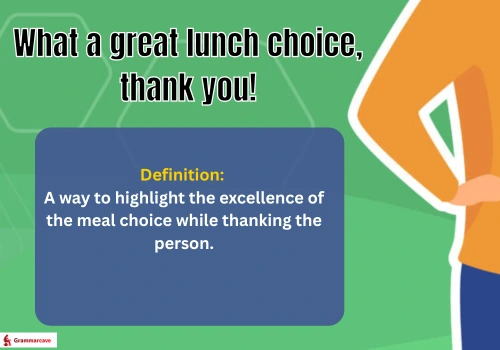
- Meaning: Recognizes the meal as a special indulgence.
- Definition: “Treat” implies something beyond ordinary.
- Explanation: Often used for surprises or luxuries.
- Example: “Oysters for lunch? What a wonderful treat—thank you!”
- Best Use: Unexpected gourmet experiences.
- Worst Use: Everyday cafeteria meals.
- Tone: Delighted and appreciative.
31. “Thanks for the nourishing meal!”
- Meaning: Appreciates healthful qualities.
- Definition: Focuses on nutritional value.
- Explanation: Emphasizes bodily benefit over taste.
- Example: “Exactly the clean eating I needed—thanks for the nourishing meal!”
- Best Use: Health-conscious gatherings.
- Worst Use: Decadent comfort food.
- Tone: Wholesome and grateful.
32. “You’re too generous—thank you!”
- Meaning: Humble response to lavish treatment.
- Definition: Acknowledges excessive kindness.
- Explanation: Suggests the gesture was beyond necessary.
- Example: “Kobe beef? You’re too generous—thank you!”
- Best Use: When someone splurges.
- Worst Use: For modest meals.
- Tone: Humbled and awed.
33. That was such a pleasant surprise—thank you for lunch!
- Meaning: It expresses that the lunch was an unexpected but pleasant signal.
- Explanation: A casual and positive way to express surprise and thanks for the lunch.
- Example: “That was such a nice surprise—thank you for lunch! I wasn’t expecting that.”
- Best Use: When the lunch was unexpected or a pleasant surprise.
- Worst Use: It may sound exaggerated if the lunch was planned and not a surprise.
- Tone: Casual and thankful
34. “Thanks for the mouthwatering food!”
- Meaning: Vivid compliment about appetizing qualities.
- Definition: “Mouthwatering” suggests irresistible appeal.
- Explanation: Sensory-focused praise.
- Example: “The aroma alone was incredible—thanks for the mouthwatering food!”
- Best Use: For exceptionally appealing dishes.
- Worst Use: Bland or simple fare.
- Tone: Sensual and enthusiastic.
35. What a great lunch choice, thank you!
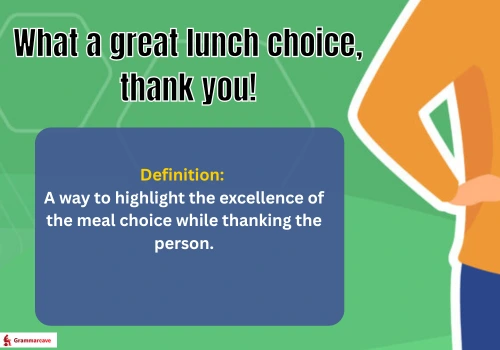
- Meaning: Complimenting the choice of food and showing gratitude.
- Explanation: A way to highlight the excellence of the meal choice while thanking the person.
- Example: “What a great lunch choice, thank you! I enjoyed it.”
- Best Use: When the lunch choice was excellent and well appreciated.
- Worst Use: If the lunch choice wasn’t great, it may come off as sarcastic.
- Tone: Positive and appreciative.
FAQs
Q1. How soon should I thank someone for lunch?
Ideally, during or right after the meal. A follow-up message is excellent for formal situations.
Q2. Is it okay to compliment the food when thanking someone?
Definitely! Praise adds sincerity: “The curry was delicious—thank you for lunch!”
Q3. Can I say “Thanks for lunch” via text?
Yes, especially if it’s informal. Add a smile or specific note for warmth.
Q4. How do I thank someone for bringing me lunch at work?
Say: “Thanks so much for lunch—super thoughtful of you!”
Q5. What do I say if the lunch included amazing company?
Try: “Thanks for lunch—and even better company!”
Q6. Can “Thank you for lunch” be too brief?
Yes, in some cases. Add a compliment or context to personalize it.
Conclusion
Even if the phrase “Thank you for lunch” looks normal, it has a deep meaning in social and professional lives. It reflects the fulfillment of a person’s ‘kindness.’ The value is always there if said to a friend or a coworker.
So, there are many ways to express yourself and thank you for lunch based on preference. From lighthearted sayings such as “Thanks for feeding me!” to more strict ones like “It was signed nicely,” it serves different purposes. “Thank you” will always be better than nothing. At its core, gratitude and an effort, even grand or simple, never fail to trigger good manners and respect. A world where kindness is hardly expressed makes a good “thank you” for lunch the enduring layer of impression.

